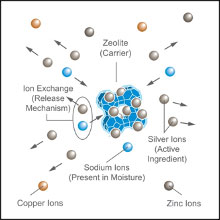In 2017, a prominent global apparel manufacturer began upgrading its double-pad chemical application system to Baldwin’s revolutionary TexCoat technology, which applies softener and antimicrobial chemicals to fabrics during the finishing process. The TexCoat system uses precision spray technology instead of padding or soaking/bath methods to evenly apply finishing chemicals.
Baldwin’s “non-contact” method of applying liquids to surfaces is highly efficient and eco-friendly because the minimum required amount of chemicals can be used. It also ensures zero contact between the fabric and the chemistry that is sprayed, eliminating contamination of finishing chemicals by the fabric. When the fabric color changes, the TexCoat system removes the need to drain the chemical pad/foulard, along with the associated downtime and environmental impact from finishing chemical waste.

In 2018, during its upgrade to Baldwin’s TexCoat, the apparel manufacturer made the decision to switch from its previous odor control chemical supplier to Sciessent’s Agion antimicrobial for improved odor-control performance of its finished garments. Agion is the “smartest” antimicrobial in the industry, only activating when it needs to defend against microbes. This innovative approach provides the longest lasting protection, combatting odor-causing bacteria for an unprecedented durability of up to 100 washes.
Sciessent’s Agion antimicrobial is customizable to meet performance and cost goals and can be applied via spray, padding, exhaust or package yarn. Agion’s safety has been demonstrated across its wide range on applications in everything from textiles and apparel to water devices, medical devices, surfaces, and more. The technology is Oeko-tex certified, bluesign® approved and listed on the Zero Discharge of Hazardous Chemicals (ZDHC) Foundation ZDHC Gateway.
Because this level of change — both antimicrobial solution and spray technology — had a significant impact on the manufacturing process, the Baldwin and Sciessent teams were tasked with verifying the successful application of Agion by TexCoat before the apparel manufacturer completed its transition from its legacy double-pad application technology.
Solution
Sciessent Technical Director Ken Johnson and Baldwin Head of Precision Spray R&D Wesley Clements traveled to the apparel manufacturer’s mill to conduct planned trials to verify that the Agion antimicrobial agent could be sprayed successfully by TexCoat and that, once proven, the results would be seamlessly replicated when rolled out to all 19 TexCoat systems in the manufacturer’s finishing department.
The apparel giant’s vertical mill in the Caribbean offered a prime opportunity to verify the stability of Agion running together with softener mixes on the lines upgraded by TexCoat. Production interruption was not an option so together with the mill technical leader, Sciessent and Baldwin carefully planned the validation trials.
The TexCoat system automates chemical changeover including the cleaning sequence between chemicals. The system is flushed with hot water and the new recipe is loaded. This all happens seamlessly with the new recipe selected by a barcode reader that scans the barcode on the work order.

A key part of the validation exercise was to verify the completeness of cleaning and refine chemical changeover sequences between chemical recipes, some of which are incompatible with one another.
The validation team perfected the chemical change sequences which reliably and automatically complete up to 40 chemical changes per line day after day.
The TexCoat system immediately demonstrated its consistent application rates of chemical finishing enabled by its metering valve technology. Agion and TexCoat performed stably and repeatably during the week-long ramp up, monitoring and training period.
“The application rate was extremely consistent from the first yard to the last yard and from batch to batch,” Johnson explained. “Agion enhances the value of the customer product, so with TexCoat we saw that very repeatable pickup ensures equal effectiveness of the antimicrobial yard after yard and batch to batch at 90 yds/min. Furthermore, the TexCoat system wasted no chemistry during color changes. This is an incredible benefit compared to either conventional padding or exhaust.”
“Sciessent was a very open and transparent partner and we were very pleased with the level of pretesting carried out by Sciessent ahead of the trials,” Clements commented. “Agion performs well in the TexCoat system, has zero issue with foaming and works with a wide range of softeners.”
Results
Converting to Baldwin’s TexCoat to apply Sciessent’s Agion antimicrobial odor control technology to tubular knitted Jersey fabric on a big scale at the high-volume mill in the Caribbean checked all the boxes for the manufacturer by providing an economical and sustainable process, which eliminated waste, while boosting quality, odor performance and productivity.

Clements and Johnson emphasized that gaining a deep understanding of the customer’s goals from the beginning, close collaboration, and Baldwin’s and Sciessent’s shared unwavering commitment to providing the highest level of service has ensured the enduring success of their first joint solution.
“Two years later, this combination continues to perform stably and applies 100 percent of the antimicrobial and softener mixes used by the mill,” Clements said. “It delivers to the manufacturer consistent quality with minimal chemical waste.”
As they celebrate the milestone marking the success of the first union of their respective leading-edge technology and chemistry, Baldwin and Sciessent plan to seek future opportunities to leverage their combined expertise to deliver turnkey, customized solutions to other textile manufacturers.
Posted March 10, 2021
Source: Baldwin Technology





